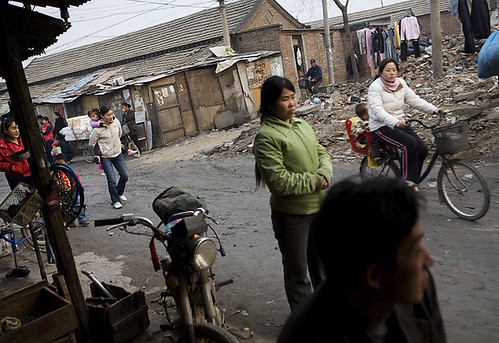靜心齋
每個人都是王子或公主, 心靈是我的王國
【時代周刊】居然登移花接木的照片詆毀北京奧運
十三姨夫
8月11日這期的《時代周刊》上刊登了一篇題為《七年期待之後,北京市民無奈地接受城市的改變——奧運前夜中國首都揭秘》的文章,署名Austin Ramzy。
文章以一個居住在北京四合院裏外國人的視角,試圖“揭示”北京奧運改造不為人知的一麵。
作者自稱於2007年搬進北京東部一條狹窄、安靜、有著四合院的老胡同,這一片由胡同組成的社區早在700年前的明朝已經落成。從07年4月份開始的幾個月,奧運改造振聾發聵:胡同的路麵重新鋪設,路燈換了新的,下水管道大修,屋頂翻新,大門重新上漆,私搭亂建的小房被拆毀,瓦礫和拆下來的垃圾堆滿了街道,其中有古老手繪圖案的木製屋簷被當作廢料。改造工程暴土狼煙,讓春天的一場沙塵暴都小巫見大巫。
寫了奧運改造工程為身邊的市民帶來的種種不便之後,作者筆鋒一轉,放眼宏觀:150萬人被迫離開北京;斥資170億美元進行環境整治,北京在奧運在開幕前夕依然煙霧籠罩;即使在實行單雙號施行之後,奧運VIP專線讓交通堵塞更為嚴重;北京人在奧運期間逃離北京並戲稱為“避運逃”;酒吧夜總會被勒令關閉,音樂會和集會被禁;普通市民買不到也買不起奧運門票,他們和奧運會最近距離的接觸不過是在街上穿著北京啤酒讚助的T恤協助安檢和巡邏。
文章還配發了一張題為《喜新厭舊——老街區被拆毀重建隻為迎奧運》的照片。
關於國外媒體對於北京奧運的負麵報道我已經看得夠夠的了,如果以事實為依據,怎麽看中國是外國人的自由,我也不想去爭論什麽。但是看了這張照片,作為一個北京人,我不得不站出來說幾句了。
照片上根本就不是北京老城區的胡同!
1. 畫麵背景的平房不是四合院,這類平房屬於北京京郊或農村院落的建築格局。十幾年前,偶爾可以在二環三環之間(例如農科院附近)見到這類建築。城區的老四合院不用紅磚,房頂的瓦也不是這種類型。
2. 畫麵左側邊上是個修車鋪,門口停了輛摩托。這種摩托車隻能在城鄉結合部看到。另外,北京城區早已不發放新摩托車牌照了。
3. 路邊私搭亂建的小棚子。這種沿街私建的小棚,北京二環以內多少年前就看不到了,更別說有七百年曆史的老胡同了。
4. 路麵沒有鋪柏油而路邊又沒有因為修路堆積的土石。北京的胡同都是柏油馬路。
5. 除了騎車帶小孩的婦女我不太確定,畫麵裏其他人都不是北京土著。
我承認這是一張真實的照片,它的確來自我的祖國——中國。但是照片陰暗視角配合尖酸的文字卻包藏著不可告人的目的。
它想告訴世界,這就是奧運前夕真實的北京:堆積如山的瓦礫,破爛的街道,晾在街道邊上花花綠綠的衣褲和行人漠然的眼神。照片上幾位主角,目光都集中在同一個方向,那裏似乎正在發生著什麽。作者其實在悄悄提醒讀者,畫麵以外就是即將到來的北京奧運:無論你看到多麽盛大的場麵,多麽光鮮的街市和多麽友好的麵孔,一切都是偽裝。這張照片才是真實的北京。
作為一個中國人,作為一個北京人,我要告訴世界,這是一個謊言!
請見後附《時代周刊》原文和鏈接。
Thursday,Jul. 31, 2008
Postcard: Beijing
ByAustin Ramzy
The sound of the Olympic games for me has always been John Williams'OlympicFanfare and Theme. But since this spring those strains have beenreplaced bythe clack and crumble of workmen with pickaxes leveling a walloutside mywindow at dawn.
In 2007 I moved into a quiet hutong, a traditional narrow lane linedwithcourtyard houses, in eastern
The hubbub produced no shortage of inconvenience for the two dozen familiesIshare a courtyard with. The work went on for weeks; sewer repairs meantwalkingthrough a ditch to leave one's door; the dust was so heavy that aspringsandstorm came and left without our noticing. But the occasionalgrumbles couldnever sink the enthusiasm of my neighbors. I came home one dayto find oneperched precariously on his roof, sawing away. "For theOlympics," hesaid with a grin. At a party in February, I asked severalneighbors their hopesfor the coming year; the most popular response was for asuccessful Games.Clearly, fixing up our courtyard was key to that. "Thework here isn't justgood for us," says my neighbor Feng Huiming, whoworks at the local postoffice. "It's good for the world."
It is with that sense of purpose that
Other problems aren't as easily covered up.
Some Beijingers have opted to leave town on what's jokingly calledabiyuntao--"avoid Olympics package"--which rhymes with theChineseword for condom. Others, including huge numbers of migrant workers, havebeenforced out. A group of builders from
In the weeks preceding the Games, authorities have closed clubs andbars,blocked concerts and other public gatherings and put an increasing numberofarmed police on the streets. Some of my neighbors have even been recruitedasvolunteer public-security monitors. They sport red-and-white poloshirtsbearing the logo of a
That's the closest most of them will come to seeing the Olympics inperson."We have no access to tickets," says Feng. "And even ifwe did,we couldn't afford them." An Olympic slogan repeated onbillboardsthroughout the city reads I PARTICIPATE; I CONTRIBUTE; I'M HAPPY.After monthsof participating and contributing, the people in this corner of thecapitalwill have to be happy catching the Games, as the rest of the world does,athome on television.
Global Dispatch For a new postcard from around the world every day, visit time.com




